
Major grants for dementia research, the arrival of special furry visitors on campus and the launch of a wide-ranging vision for a better Australia by 2030 are among this week’s Flinders highlights.
New research grants for dementia studies
Professor Lily Xiao, from Flinders University’s Caring Futures Institute, and Flinders ARC Discovery Early Career Research Fellow Associate Professor Kate Laver, have been successful in obtaining two of five Dementia Centre for Research Collaboration research grants.
The total funding pool of $1.8 million will support trials and studies to produce evidence interventions, promote practice change and inform policy. These projects provide vital insights into reducing dementia risk, improving accurate and timely diagnoses and establishing treatment and care options for people who live with dementia.
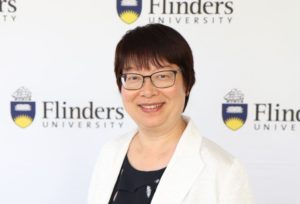
Professor Lily Xiao’s research project aims to strengthen partnerships with carers through innovative delivery of an Australian iSupport for Dementia program.
“Informal carers are the cornerstone of helping people with dementia remain at home for as long as possible. However, most are less prepared for their role than professional carers,” she says.
Professor Xiao’s team has helped develop the World Health Organization iSupport for Dementia resource, a comprehensive online dementia education and skill training program for informal carers. “We will work with carers, hospital memory clinics and community aged care providers to implement the Australian iSupport program,” Professor Xiao says.
“The ultimate goal of this research is to provide multilingual iSupport programs for carers from culturally and linguistically diverse communities and therefore improve quality of life for people living with dementia and their carers in the community.”
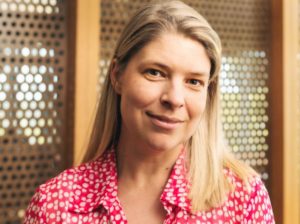
Associate Professor Laver says, “Current practice does not support people after receiving a diagnosis of dementia. People with dementia have reported that post diagnostic supports which establish hope and promote how to live well with a diagnosis of dementia are critical.”
Her project will test a ‘Take Charge’ intervention which involves early interventions shortly after a diagnosis of dementia. This aims to promote hope, independence, and quality of life with the ultimate goal of keeping the person at home and engaged in the community for longer. “This approach is innovative and could change the current usual trajectory of decline after diagnosis,” she says.
The project led by Associate Professor Kate Laver, a research fellow at the Flinders Health and Medical Research Institute, will also receive funding from The Hospital Research Foundation.
“People with dementia have reported that there is a need to maintain hope in the absence of a cure, and evidence-based interventions are equally as important in the first few weeks and months following diagnosis as it is in the longer-term,” she says.
Furry friends make study fun
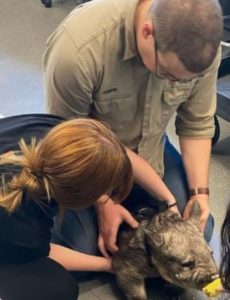
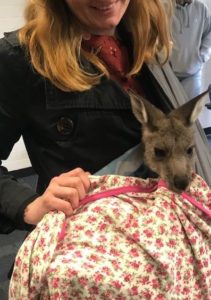 A hungry wombat and cuddly rescue joey were spotted around campus recently, with the furry friends shared on social media for others to share. The adult wombat and several other animals were brought in to enlighten science students in an annual locomotion workshop for the BIOL3703 topic in Vertebrate Palaeontology. Lecturer and Ecology and Evolution researcher Dr Aaron Camens says the short visit was popular with students, with the animals safely returned to the sanctuary of their respective homes.
A hungry wombat and cuddly rescue joey were spotted around campus recently, with the furry friends shared on social media for others to share. The adult wombat and several other animals were brought in to enlighten science students in an annual locomotion workshop for the BIOL3703 topic in Vertebrate Palaeontology. Lecturer and Ecology and Evolution researcher Dr Aaron Camens says the short visit was popular with students, with the animals safely returned to the sanctuary of their respective homes.
Meanwhile, palaeontology PhD candidate Amy Tschirn has been spotted around Bedford Park nurturing a bettong, and another student (pictured left) brought a rescue joey to University – also delighting teachers and staff last week.
Southgate Institute hosts Medical Journal forum
Professor Fran Baun, director of the Southgate Institute for Health Society and Equity, has contributed to a special MJA Supplement entitled Australia in 2030: What is our path to health for all? DOI: 10.5694/mja2.51020 which will be launched at Flinders University, 182 Victoria Square (Level 10) from 12.30-2.30pm on Thursday 13 May 2021.
Dr Sandro Demaio, VicHealth Chief Executive, and Associate Professor Carmel Williams, Director of the Centre for Health in All Policies Research Translation, Health Translation SA will also respond to the report’s recommendations. RSVP: enquiries.southgateinstitute@flinders.edu.au
In the supplement’s first article, ‘How Australia improved health equity through action on the social determinants of health’ focuses on the disruption of the COVID-19 pandemic.
authors including Professor Baum, Sharon Friel, Sharon Goldfeld, Belinda Townsend, Cara Büsst and Lewis Keane say COVID-19 provides an “important window” of opportunity to address the widening gaps in social and health equity in Australia.
The supplement includes articles on:
- Building stronger individual and collective wellbeing via Aboriginal and Torres Strait Islander connection to culture
- Healthy, liveable and sustainable communities as physical determinants of health
- The Anthropocene: the ecological determinants of health
Fran Baum, Sharon Friel, Phil Baker, Kathryn Bowen and Cara Büsst have also written the chapter entitled: Governance for health and equity: a vision for our future.
Deciphering the continued relevance of Dante
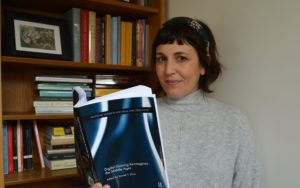
Flinders University teacher and researcher Irene Belperio – who has worked in Italian Studies, ageing and migration, ageing and disability, and in learning support – has a special research focus on Dante Studies, and has published a new book, “Dante’s Commedia for our time: is the traditional canon still relevant?” (Troubador Publishing).
The text looks at how technology and critical pedagogy can be used to make classic Humanities texts, which some many ancient and impenetrable, to be presented as relevant and engaging for current university students.
“I investigate Dante Alighieri’s Divine Comedy and look specifically at the work’s polysemy (its multilayered nature with meaning from the most literal aspect of the story to symbolism and allegory) and its remediation potential,” says Dr Belpiro. “Given the popularity of the work, it has been remediated countless times and in multiple forms, such as novels, cinema, television, advertising and gaming.”
Dr Belpiro notes that the Inferno (the first canticle of the Divine Comedy) was used as inspiration for a video game by Visceral Games called Dante’s Inferno. Also, a feature length anime was then made based on the game called Dante’s Inferno. An animated epic. The anime was made available on YouTube in 2012 and Dr Belpiro analysed 3000 comments posted in relation to it, noting how it connected people to the poem in a way which is meaningful, relevant and interesting.
“Given the accessibility of YouTube, the platform eliminates many of the traditional barriers of the university classroom, and I suggest some of this as potential ways forward for students but also for humanities tertiary classrooms that can sometimes seem redundant in the contemporary university setting,” says Dr Belpiro.
“Introducing Dante to students through a relatable medium, such as cinema or gaming, enables gaps of time, language and milieu to be bridged. Information and communication technologies particularly have been shown to help students with engagement, retention and understanding. They also allow students access to what would otherwise be impenetrable pieces of literature and yet within these works, there is truly a treasure-trove of learning which it would be a shame to forget.”

